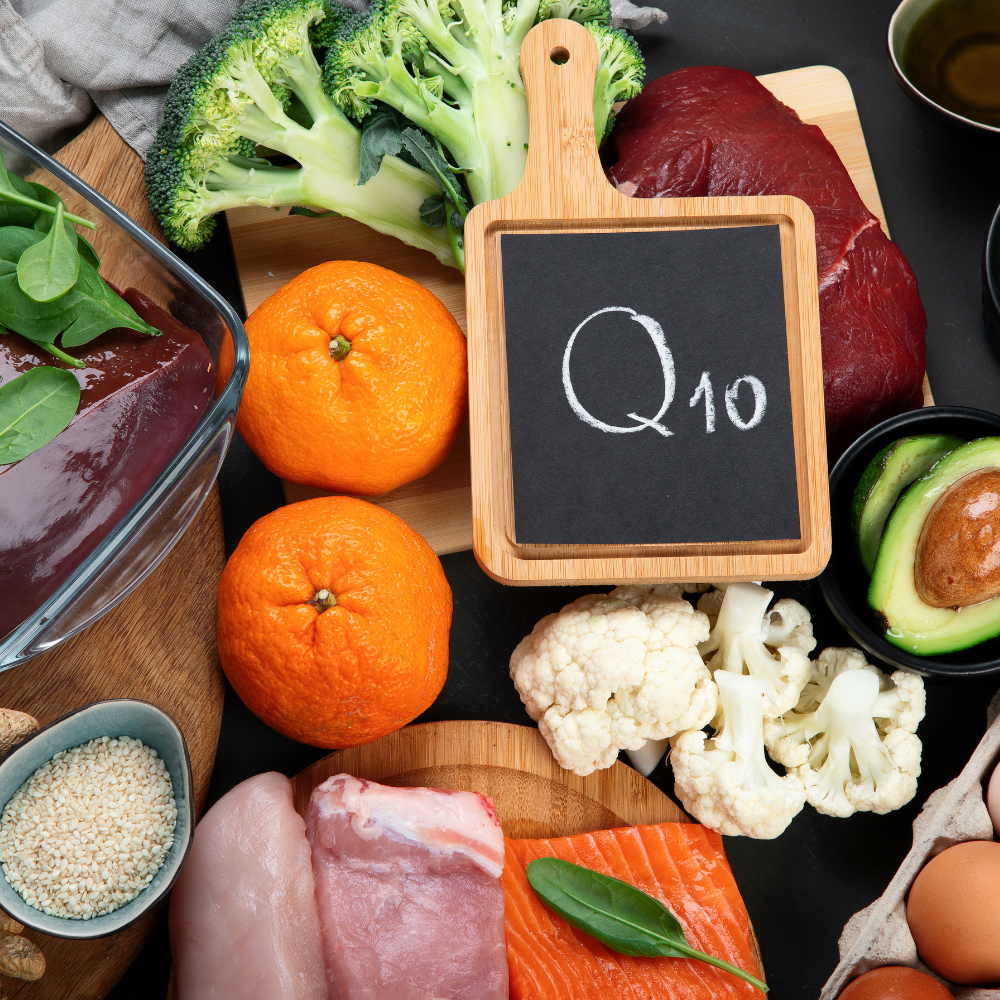Introduction: What Is CoQ10? Coenzyme Q10 (CoQ10) is a naturally occurring antioxidant that exists in every cell, playing an essential role in energy production. It helps protect cells from oxidative stress, making it especially important for the heart, an organ that demands high energy to function optimally. While our bodies can produce CoQ10, levels may decrease with age, certain health conditions, or stress, so supporting it through diet and lifestyle can be key for heart health and overall vitality.
Role of CoQ10 in Heart Health CoQ10 benefits cardiovascular health in several ways, contributing to a heart-healthy lifestyle:
-
Energy Production CoQ10 is essential for creating adenosine triphosphate (ATP), the primary energy source for cells. The heart requires substantial ATP to pump blood effectively, and CoQ10 helps support this energy demand, particularly during physical activity or stress.
-
Antioxidant Protection As a potent antioxidant, CoQ10 protects the heart against oxidative damage, which can contribute to cardiovascular disease. By neutralizing free radicals, CoQ10 reduces inflammation and supports overall heart health.
-
Healthy Blood Pressure Studies suggest that CoQ10 may help lower blood pressure, promoting better blood vessel function and overall cardiovascular health. When combined with a balanced diet, regular exercise, and stress reduction, CoQ10 can support a holistic approach to maintaining healthy blood pressure.
-
Enhanced Recovery After Heart Events For individuals recovering from heart events, such as a heart attack or surgery, CoQ10 may support recovery by enhancing cellular energy and reducing oxidative stress, both critical factors in the healing process.
Benefits of CoQ10 for Cellular Energy and Wellness Beyond heart health, CoQ10 is crucial for cellular energy production throughout the body:
-
Boosting Daily Energy Levels Regular CoQ10 intake, combined with whole foods and lifestyle habits that promote energy, can help reduce fatigue, benefiting those with chronic fatigue, fibromyalgia, or conditions impacting cellular energy.
-
Supporting Physical Activity For fitness enthusiasts, CoQ10 can enhance endurance by improving energy production and reducing oxidative stress from exercise, potentially supporting performance and recovery when combined with a balanced diet.
-
Mitochondrial Function CoQ10 plays a vital role in mitochondrial health, the “powerhouses” of cells, which need support from CoQ10 to generate ATP. Healthy mitochondria are essential for overall vitality and well-being.
-
Brain Health Support CoQ10 can also support cognitive health by helping the energy-demanding brain maintain efficient energy production. Combined with a nutrient-rich diet and regular exercise, CoQ10 can play a role in overall brain health.
Whole Food Sources of CoQ10 While CoQ10 supplements may be beneficial, especially for those with specific health needs, whole foods should be the first approach to boosting CoQ10 levels. Some rich dietary sources include:
-
Fatty Fish Salmon, mackerel, and sardines are high in CoQ10, as well as heart-healthy omega-3 fatty acids.
-
Organ Meats Beef liver and heart provide high levels of CoQ10, but consuming them in moderation is ideal.
-
Nuts and Seeds Walnuts, peanuts, and sesame seeds are convenient plant-based sources of CoQ10.
-
Whole Grains and Leafy Greens Oats, spinach, and broccoli contain smaller amounts of CoQ10 but are beneficial for their overall nutrient profile.
Choosing CoQ10 Supplements If you consider a supplement to ensure optimal CoQ10 levels, here are a few key points:
-
Forms of CoQ10 CoQ10 supplements come as ubiquinone or ubiquinol, the active form, which tends to be more readily absorbed by the body.
-
Dosage Recommended doses vary based on individual health needs, typically between 100 to 300 mg daily, but it’s always best to consult with a healthcare provider for personalized guidance.
-
Quality and Purity Select supplements that are third-party tested for quality and free from unnecessary additives, fillers, and allergens to ensure safety and efficacy.
-
Absorption Enhancers Supplements with added piperine (black pepper extract) or phospholipids can improve CoQ10’s bioavailability, enhancing its benefits.
Conclusion: Support Heart and Cellular Health with CoQ10 CoQ10 plays a powerful role in heart and cellular health, supporting cardiovascular function, energy levels, and brain wellness. Start by incorporating CoQ10-rich foods into your daily routine and, if needed, consult a healthcare provider about supplement options tailored to your needs. With a balanced diet and lifestyle, CoQ10 can be a valuable addition to an integrative health approach for lifelong vitality.


